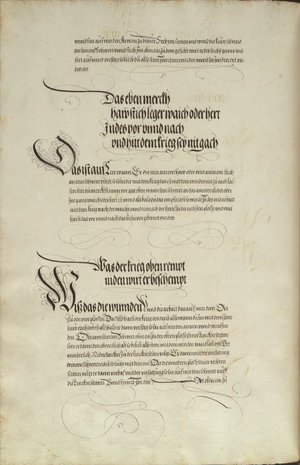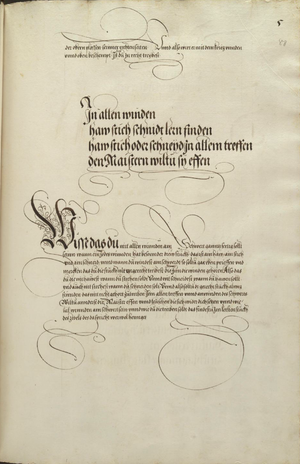|
|
You are not currently logged in. Are you accessing the unsecure (http) portal? Click here to switch to the secure portal. |
User:Kendra Brown/Latin Lew/Piece 021
Contents
Dresden
German
Transcription
[3] Was der krieg oben rempt
niden wirt er beschempt
Wisz das die winnden Vnnd die arbait darausz mit dem Ort zu den vier plössen Dasselb haist der krieg. den treib also wann du Im mit dem zornhaw einhawest. Alsz bald er dann versetzt so far auf mit den armen vnnd wind Im den Ort ann seinem Schwert oben ein zu der obern plosse seiner Lincken seite. setzt er dann den obern stich ab. so beleib also steen mit dem winden. vnnd lasz den Ort vnndersich Nidersincken zu der lincken seiten volgt Er dann mit der versatzung deinem schwert nach so suche mit deinem Ort die vnndern plösse seiner rechten seite. volgt er dann virbas mit der versatzung so far auf mit dem schwert auff die Lincken seite. Vnnd henng Im den ~~~~ Ort oben ein zu
[1] der obern plössen. seinner rechten seiten. Vnnd also wirt er mit dem krieg vnnden vnnd oben beschempt. Ist das du In recht treybest.
Sandbox German
- In allen winden
- haw stich schnidt lern finden
- haw stich oder schneÿd In allem treffen
- den Maistern wiltu in effen
- Wisse daß du mit allen winnden am Schwert gannz fertig sollt seinn,
- wann ein Jedes winnden,
- hat besonnder drew stuckh,
- das ist ain haw,
- ain stich und ain schneid,
- vnnd wann du windest,
- am schwerdt,
- so soltu gar eben prieffen,
- und mercken das du die stückh nit ungerecht treibest,
- die Inn die winden gehören,
- Also das du die nit hawest,
- wann du stechen soldt,
- Vnnd nit schneidest,
- wann du hawen sollt,
- und auch nit stechest wann du schneiden solt,
- Vnnd also soltu dz,
- gerecht stuckh alweg finnden,
- das mit recht gehort,
- zutreiben,
- Inn allen treffen,
- vnnd anwinden des Schwerts,
- Wiltu annderst die Maister effen,
- vnnd teuschen die sich wider dich setzen,
- vnnd wievil winnden am schwert sein,
- vnnd wie du die treiben soldt,
- daß findestu Im letsten stückh deß zedels,
- deß da spricht,
- wer wol hennget
English
Sandbox English from German
- Learn to find the cut, thrust, slice
- In all twists.
- Cut, thrust, or slice in all encounters
- with the Masters, if you want to fool them.
- Know that you should be completely prepared with every twists on the sword.
- Because every winding
- has three different techniques:
- That is a cut,
- a thrust and a slice.
- And whenever you twist
- on the sword,
- you should check, precisely at that time,
- and take note that you do not incorrectly execute techniques
- that are part of twists.
- Therefore, that you do not cut
- when you should thrust,
- and do not slice
- when you should cut,
- and also do not thrust
- when you should slice.
- And therefore, you should always
- find the correct technique
- that is correctly understood
- to be executed
- in every exchange
- and every twists on of the swords.
- Secondly, if you want to fool the masters
- and deceive those who oppose you.
- And you will find in the last part of the Zedel [didactic poem] *
- at the point which says,
- “Who hangs well, ...”,
- how many twists there are,
- and how you should execute them.
Note that lines 25-27 in the English follow lines 28-29 in the German.
Smooth English from German
- Learn to find the cut, thrust, slice
- In all twists.
- Cut, thrust, or slice in all encounters
- with the Masters, if you want to fool them.
Know that you should be completely prepared with every twists on the sword, because every twists has three different techniques: that is a cut, a thrust and a slice. And whenever you twist on the sword, you should check, precisely at that time, and take note that you do not incorrectly execute techniques that are part of twists. Therefore, that you do not cut when you should thrust, and do not slice when you should cut, and also do not thrust when you should slice. And therefore, you should always find the correct technique that is correctly understood to be executed in every exchange and every twists on of the swords.
Secondly, if you want to fool the masters and deceive those who oppose you. And you will find in the last part of the Zedel [didactic poem] at the point which says, “Who hangs well, ...”, how many twists there are, and how you should execute them.
Munich
Latin
Transcription
[3] Item cum adversarius ex forma punctionis vel Ictus ensem tuum contigerit, in primo conflictu, tu noli exercere statim Ictus crebros, sed festina lentè, et maximè curabis, ut prius observes num in ensium collisione molliter vel fortiter ensem teneat, Sin id deprehenderis, uti poteris intorsionibus, atque crebris ictibus quem habitum nos Germani bellum appellamus appetendo nuditates proximè obvias.
Sandbox Latin
- Habitus, quem nos bellum appellamus est,
- cum intorsionibus et quicquod inde per mucronem versus quatour nuditates formatur,
- utimur.
- Verum eum hac ratione exercebis:
- Si contra hostem Ictum ex ira appellationem adeptum ferias,
- isque, eum exceperit[1],
- sublatis brachiis,
- mucronem ensis tui iuxta ipsius ensem superne contra hostis superam nuditatem lateris sinistri.
- Verum si eam vim removerit[2],
- in habitu intorsionis consistere memineris,
- sed mucronem deorsum convertas in latus sinistrum.
- At si adversarius id quoque removeat[3],
- tunc inferiores eius nuditates lateris dextri mucrone investiges,
- et si id etiam repellat[4],
- tu ense sublato in latus sinistrum,
- contra latus hostis dextrum mucronem nuditates supernas inquirendo inmittas,
- itaque habitum belli vel militiae infernè et supernè hostis exagitabitur,
- si quidem eum iuxta Athletarum veram instructionem exercueris.
English
Sandbox English from Latin
- The aspect of the art, which we call beautiful warfare,
- uses the wrappings and it is shaped from that place by the point against four openings,
- [subsumed into 2]
- certainly you will practice it [this aspect of the art] with this method:
- If you would strike against the enemy a winning stroke named from ire,
- and HE intercepts it,
- when the arms have been lifted,
- join the point of your sword over his sword and against the enemy's upper opening on the left side.
- Certainly if he were to set his strength aside,
- remember to persist in the skill of wrapping,
- but also change the point below into the left side.
- And if the adversary would also set it aside,
- now seek out his lower opening of the right side with the point,
- and if he would likewise drive it back,
- lift with the sword into the left side,
- you send the sword in against the right side of the enemy [as a] means of seeking out the upper openings,
- and so the enemy will have been goaded above and below during the aspect of the art called beautiful warfare or soldiering,
- if indeed you will exercise/practice that true instruction alongside athletes.


